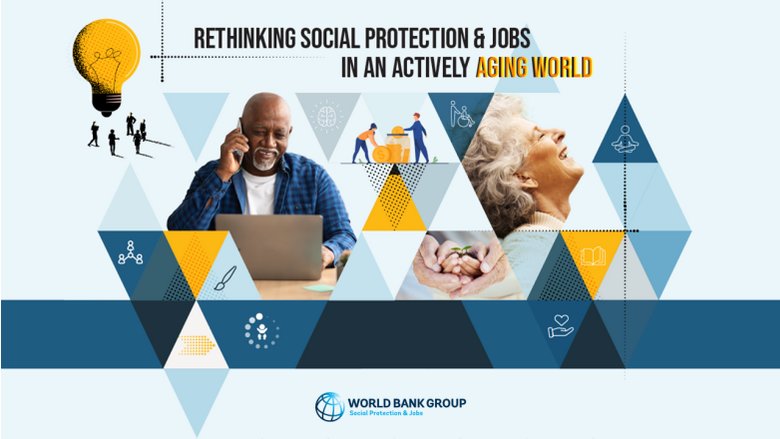Overview
Demographic change is increasingly shaping our future. Globally, people above the age of 65 outnumber children under 5 and over two-thirds of them live in less developed regions of the world. By 2050, there will be 1.25 billion people who are 65 and over in less developed regions, around 757 million more than in 2020.
Global aging is a triumph of development made possible through rapid increases in life expectancies and falling fertility. It brings new opportunities but also challenges for governments, individuals, households, communities, and economies. Countries need to adapt their social protection and jobs policies and programs to address these challenges and reap the societal and economic benefits of aging. Their ability to adapt will determine their future prosperity and social stability.
Changing how we think about aging
Traditionally aging is framed largely around risks to economic growth and public finances, shrinking working age populations, the need to provide services and benefits to a growing older population, and risks of rising inequality and social tensions.
While these risks are real, societal aging can also present opportunities and the potential to mitigate risks. This is also not just an agenda for older developing countries. Younger countries also need to prepare early for the demographic transition. Timely policy action can turn global aging into a source of inclusive economic growth. It can also improve outcomes for all, for example, through labor migration across countries at different stages of demographic transition.
How countries can adapt to societal aging
Older people must be seen first as individuals, not just as economic agents. They are also not a homogenous group. Policies need to address their diverse and evolving needs and protect their rights by focusing on social isolation, abuse of older people and age-based discrimination. Countries must also recognize and value older peopleˇŻs economic and social contributions as workers, caregivers, volunteers and sources of financial support, but also as repositories of social capital and norms. In addition, with the right policy mix and institutional support, societal aging can create new market opportunities, employment and innovation.
Promote a cross-sectoral response
The multidimensional nature of aging requires adjustments at all levels of society. Reforms should be coordinated across sectors and involve collaboration across government agencies and with civil society and development partners to deliver positive outcomes. Through a holistic approach across the life course, countries can create links between pension and tax systems; pensions, skills development, and labor force participation of mature workers; migration, labor force and long-term care; or social services with childcare and workforce participation of prime-age adults, especially women.
Social protection and jobs are key areas that need adaptation to minimize the liabilities and capitalize on opportunities associated with societal aging. Countries need adequate labor markets and skills policies to enable mature workersˇŻ labor force participation while also enhancing old-age financial protection through social insurance and/or social assistance, social services and long-term care systems. All policies should consider gender to increase work opportunities for women, ensure they can benefit from more inclusive social security systems, and reduce womenˇŻs care burden by investing in care systems. Women have higher life expectancies than men, so are more likely to be alone and vulnerable in old age.
Consider four principles to shape inclusive and productive aging societies:
- Provide choice for aging people with policies and practices that maximize individual agency in work, retirement, living and care decisions and arrangements.
- Establish defaults that protect those who do not exercise choice and encourage socially desirable outcomes, e.g., default opt-ins or auto-enrollment for pension schemes.
- Maintain flexibility in policies, programs and markets to reflect the diversity among older people and the evolution across the life cycle.
- Practice empathy toward older people by eliminating age-based discrimination, promoting autonomy and dignity, valuing their social and economic contribution to society and providing equal access to services and opportunities.
What is the World Bank doing to support the aging transition?
ÄľąĎÓ°Ôş is engaging with countries through policy, technical assistance, lending, and analytical work to help them manage the aging transition. Addressing societal aging is central to the 2030 Sustainable Development Goals and the World BankˇŻs Human Capital Project.
Key areas of engagement include national ageing strategies, labor market and skills policies, old age financial protection through social insurance and social assistance, social services and long-term care systems, and social protection delivery systems.
Read the report: Unlocking the Power of Healthy Longevity




